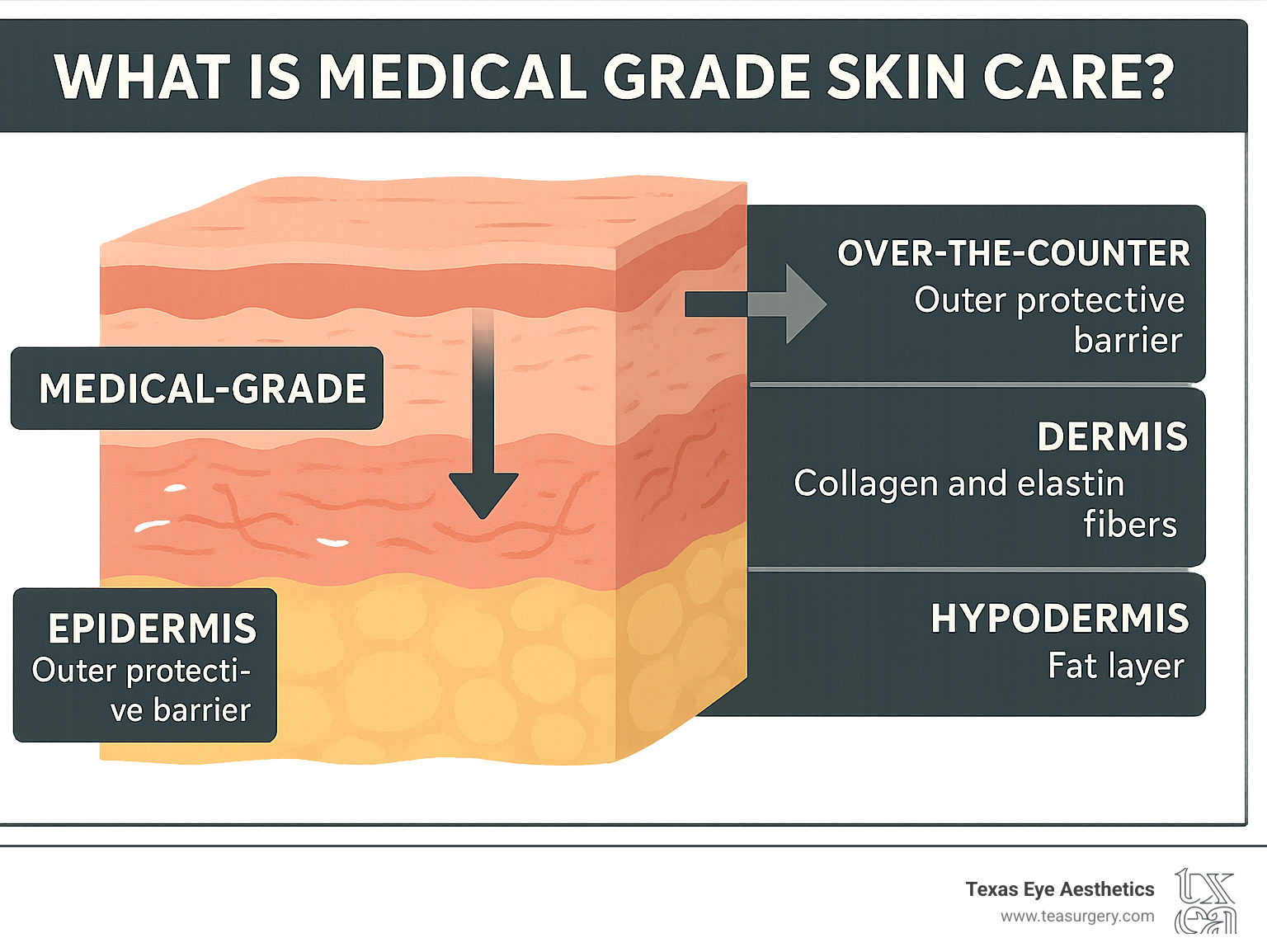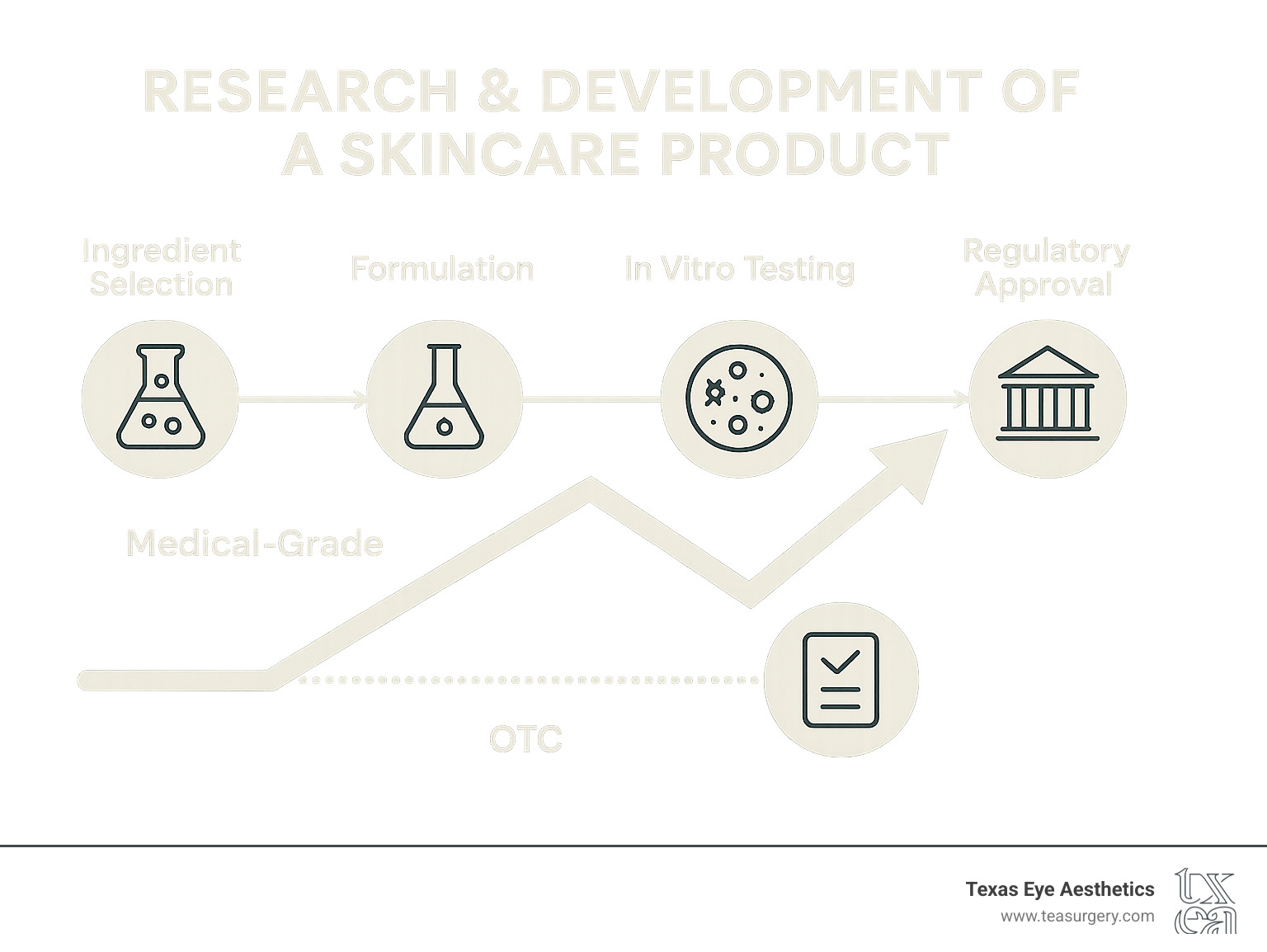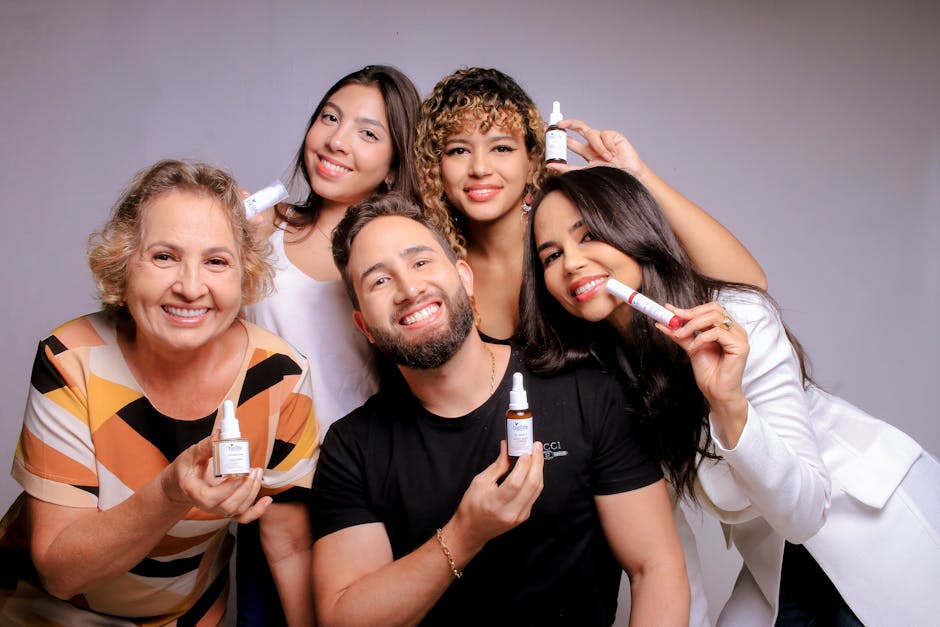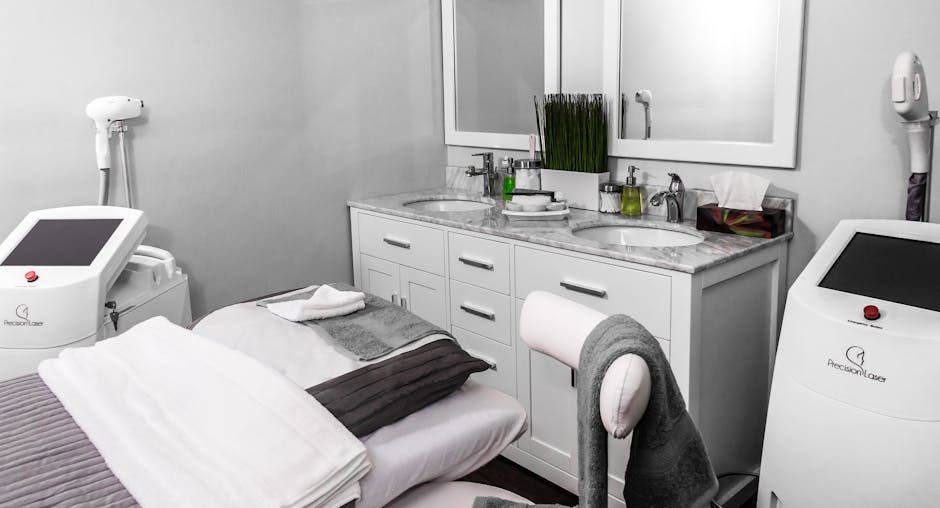What is medical grade skin care is a question that deserves a straight answer: it's primarily a marketing term with no official FDA regulation, used by brands to suggest higher quality, potency, or clinical backing compared to over-the-counter products.
Quick Answer:
The skincare industry loves its buzzwords. Walk into any beauty store and you'll see products labeled "medical-grade," "pharmaceutical-strength," or "cosmeceutical." But what do these terms actually mean?
Here's the reality: the beauty category of "medical grade" skincare is nebulous. Unlike prescription medications, these products don't require FDA approval for their "medical-grade" claims. Anyone can slap this label on their products.
Yet there are real differences between products sold in medical offices versus those on drugstore shelves. The key lies in understanding ingredient purity, concentration levels, and formulation science - not marketing promises.
For busy professionals like yourself who value results over hype, cutting through this confusion matters. You want products that actually work, not just expensive packaging with fancy claims.

Surprisingly, what is medical grade skin care doesn't have an official answer because there's no legal definition for "medical-grade" in skincare. It's a marketing term that sounds impressive but lacks regulatory backing.
The FDA recognizes two skincare categories: cosmetics and drugs. Cosmetics are for cleansing, beautifying, or improving your appearance. They must be safe, but companies don't have to prove they actually work.
Drugs, on the other hand, are products that treat, prevent, or affect how your body functions. Think sunscreens or acne treatments with active ingredients like benzoyl peroxide. These undergo stricter regulation and must follow Current Good Manufacturing Practices. They list an "active ingredient" with its concentration and an expiration date.
This distinction matters because a brand can label a product "medical-grade" without meeting special standards beyond regular cosmetic requirements. It's like calling yourself a "gourmet" chef—it sounds fancy, but anyone can do it.
The Modernization of Cosmetics Regulation Act of 2022 (MoCRA) improved cosmetic safety with requirements for adverse event reporting and better manufacturing practices. However, it doesn't regulate marketing claims like "medical-grade," "clean," or "natural." These buzzwords remain unregulated.
So, you can't just trust a label. Instead, look for products with legitimate research and pay attention to the "active ingredients" section. It's your best clue about whether a product might deliver results. The unregulated nature of these claims means consumer awareness is your best defense against marketing fluff.
While the term "medical-grade" isn't regulated, products sold in dermatology offices and medical spas often deliver more dramatic results than drugstore options. The differences are rooted in science and formulation, not just marketing fluff.
Essentially, what is medical grade skin care comes down to how these products are made, their ingredients, and how they're designed to work with your skin. It's like comparing a basic toolkit to professional-grade equipment—one is built for more serious results.
CharacteristicMedical-Grade SkincareOver-the-Counter (OTC) SkincareIngredient PurityOften required to contain ingredients that are 99% pure, with fewer fillers or synthetic additives.May contain fillers, lower purity ingredients, or synthetic additives and fragrances.ConcentrationMade with higher concentrations of active ingredients, designed to elicit a more significant biological response.Contains lower, often sub-therapeutic, concentrations of active ingredients to minimize potential irritation and allow for broad consumer use without professional oversight.Skin PenetrationFormulated with advanced delivery systems to penetrate deeper into the skin's dermis, where collagen and elastin are producedPrimarily designed to work on the skin's surface (epidermis); ingredients typically do not penetrate deeply enough to make significant, long-term cellular changes.Scientific EvidenceBacked by clinical research studies, often peer-reviewed, demonstrating efficacy and safety for specific skin concerns.Not required to have clinical studies to make claims about efficacy. Claims are often cosmetic (e.g., "reduces the appearance of wrinkles") and cannot legally state they "treat" a skin condition.AvailabilityTypically sold through licensed skincare professionals (dermatologists, plastic surgeons, medical spas) who can provide personalized recommendations and monitor results.Widely available in drugstores, department stores, grocery stores, and online retailers, accessible to the general public without professional guidance.
The biggest difference is that medical-grade products are formulated for results, while OTC products are for mass appeal. This means medical-grade options pack more punch but require professional guidance to use safely and effectively.
When you're wondering what is medical grade skin care, it often comes down to the ingredients in the bottle and their concentration.
Medical-grade products often contain ingredients that are 99% pure. This purity makes a world of difference, as a serum that's mostly active ingredient is more effective than one diluted with fillers and preservatives.
The gold standard for ingredient quality is a USP monograph. When an ingredient meets USP standards, it's pure enough for use in medications. Ingredients like niacinamide, salicylic acid, and retinol can have USP monographs, signifying they are the real deal.
Purity is only part of the story; concentration levels are where medical-grade products really shine. A drugstore retinol might contain a lower concentration of retinol, while a medical-grade option could have a higher concentration or use a retinoid instead. Similarly, the Cosmetic Ingredient Review (CIR) considers 10% glycolic acid safe for OTC use, but stronger concentrations need professional supervision.
This higher potency allows medical-grade products to deliver faster, more noticeable results because they are designed to work, not just play it safe for the mass market.
Vitamin C stability is another game-changer. This ingredient is notoriously unstable, but medical-grade brands invest in advanced stabilization techniques to ensure your serum remains effective.
Here's where the science gets really cool. Your skin isn't just one layer – it's a complex system with different zones that do different jobs. Most over-the-counter products are designed to work on the epidermis, your skin's outer protective layer. They might hydrate or protect, but they're basically working on the surface.
Medical-grade products are formulated with sophisticated delivery systems that can penetrate deeper into the dermis – and that's where the magic happens. The dermis is home to your collagen-producing cells, elastin fibers, and all the structures that keep your skin looking youthful and healthy.
When active ingredients reach the dermis, they can actually stimulate collagen production, repair sun damage, and make real, lasting changes to your skin's structure. It's like the difference between putting a fresh coat of paint on a house versus actually fixing the foundation.
This deeper penetration is why medical-grade products often deliver more dramatic results in less time. They're not just sitting on top of your skin looking pretty – they're getting down to business at a deeper level.
For patients in Central Texas who want to take their skin change even further, we offer advanced laser treatments that work synergistically with professional-grade skincare.
This is where medical-grade skincare really separates itself from the pack. While OTC brands can market based on consumer surveys or small studies, medical-grade products are often backed by rigorous clinical research. Not all products undergo such rigorous studies, but some undergo the highest levels of research.
We're talking about double-blind, placebo-controlled studies – the gold standard of scientific research. In these studies, neither the participants nor the researchers know who's getting the real treatment and who's getting a placebo. This eliminates bias and gives us reliable data about whether a product actually works.
Take this example of double-blind research published in a peer-reviewed journal. This kind of rigorous testing is what separates medical-grade claims from marketing hype.
Medical-grade companies often invest heavily in research and development rather than flashy advertising campaigns. They're betting that results will speak louder than celebrity endorsements – and for many patients, that bet pays off.
The result? When a medical-grade product claims to reduce wrinkles or fade dark spots, there's usually measurable, quantitative data to back it up. OTC products aren't required to have this level of proof, which is why their claims often use softer language like "may help reduce the appearance of" rather than definitive statements about treatment.

When you understand what is medical grade skin care truly offers, the excitement comes from seeing how these powerful formulations tackle specific skin concerns. Their higher potency and deeper penetration offer targeted solutions that go far beyond what you'll find on drugstore shelves.

Whether you're dealing with fine lines, stubborn dark spots from years of Hill Country sun, or persistent breakouts, medical-grade ingredients are formulated to deliver real results. Let's explore how these powerhouse products address the most common skin concerns.
Collagen and elastin break down as we age, a process accelerated by sun, stress, and environmental factors in Central Texas. Medical-grade anti-aging ingredients work in the deeper levels of the skin to counter these effects.
Retinoids, vitamin A derivatives like retinol and tretinoin, are the gold standard. They boost collagen production, accelerate cell turnover, and smooth fine lines. Medical-grade versions are more potent than OTC options.
Peptides signal your skin to produce more collagen. Combined with growth factors (proteins that promote cell regeneration), they form a powerful duo to improve skin firmness and texture.
Antioxidants like vitamin C, vitamin E, and ferulic acid protect skin from free radical damage, preventing collagen breakdown and supporting skin health.
These ingredients create a comprehensive anti-aging approach. For more intensive solutions, dermal fillers and neurotoxins can complement your skincare routine.
Dark spots and uneven skin tone are stubborn, a common concern for our patients in Dripping Springs and Kyle. Medical-grade formulations offer powerful solutions in this fight.
Vitamin C (L-ascorbic acid) is a multitasker. It protects from environmental damage and inhibits melanin production, brightening skin and fading dark spots. The stability of medical-grade formulas ensures consistent, effective results.
Kojic acid, derived from fungi, blocks melanin-producing enzymes. Azelaic acid, from grains, tackles both hyperpigmentation and inflammation, making it ideal for those with dark spots and breakouts.
These ingredients break down existing pigmentation and prevent new discoloration, resulting in a clearer, more even complexion. For stubborn pigmentation, our IPL laser treatments can provide additional support.
Adult acne is common. Medical-grade solutions have the potency to clear existing breakouts and prevent future ones.
Salicylic acid (BHA) is oil-soluble, allowing it to penetrate pores and dissolve the oil and dead skin cells that cause acne. While OTC products for acne are capped at 2%, medical-grade versions often have improved delivery systems for better penetration.
Glycolic acid (AHA) exfoliates the skin's surface, promoting cell turnover to prevent clogged pores and improve texture. Benzoyl peroxide adds antibacterial power, killing acne-causing bacteria and helping shed dead skin cells.
These active ingredients offer a comprehensive approach to acne management by clearing blemishes, reducing inflammation, and preventing future breakouts. The result is clearer, healthier-looking skin.
Navigating the vast and often confusing skincare market can feel like a full-time job. With so many products claiming to be the "best," how do we choose what's right for us? This is where the guidance of a professional becomes invaluable.

Here's the thing about what is medical grade skin care - these products pack a serious punch. Because they contain higher concentrations of active ingredients, they're more potent and can sometimes cause irritation or unwanted side effects if you're not using them correctly. It's like the difference between taking a gentle yoga class and jumping into an advanced CrossFit session without proper guidance.
Dermatologists and licensed aestheticians bring years of training in skin anatomy, physiology, and the science behind skincare ingredients to the table. They can look at your skin and see things you might miss - maybe your barrier is compromised, or you have underlying sensitivity that could react poorly to certain ingredients. They're like skilled detectives, piecing together clues about your skin's unique needs.
What makes professional guidance so valuable is the personalized approach. Your coworker might rave about her glycolic acid routine, but that doesn't mean it's right for your skin type or concerns. A professional can assess your skin barrier function, identify any sensitivities, consider your lifestyle factors, and create a custom plan that actually works for you.
Think about preventing side effects too. The FDA warning on high-concentration peels serves as a stark reminder that potent ingredients require respect and proper supervision. A professional can guide you on how to introduce strong actives gradually, manage any initial redness or peeling, and ensure you're building tolerance safely.
At Texas Eye & Aesthetics, our team led by Dr. David Gay understands that great skin results come from combining quality products with expert guidance. We've seen too many patients who've damaged their skin barriers by diving into potent products without proper support.
Since the "medical-grade" label isn't regulated, how can you spot the real deal from clever marketing? It's easier than you might think once you know what to look for.
Clinical data is your best friend. The most reliable indicator of whether a product actually works is solid research backing it up. Look for brands that openly share their study results - ideally those conducted with placebo groups and assessed by unbiased third parties. Even better if the research appears in peer-reviewed journals. If a company spent money on real research, they're usually proud to show it off.
USP-grade ingredients are another green flag. As we discussed earlier, ingredients with USP monographs meet pharmaceutical standards for purity and quality. While not every ingredient will have this designation, it's a strong indicator when they do.
Learning to read ingredient lists is like developing a superpower. Familiarize yourself with key active ingredients and their typical effective concentrations. Be suspicious if the actives you're looking for appear at the very end of a long ingredient list - that usually means they're present in trace amounts that won't do much.
Professional endorsements carry weight, especially when they come from board-certified dermatologists or licensed aestheticians who stake their professional reputation on the products they recommend. These professionals have seen countless products come and go, so their experience matters.
Finally, avoid marketing traps that rely on buzzwords without substance. Be skeptical of vague claims, overly enthusiastic testimonials without scientific backing, and products that throw around terms like "clean" or "natural" without explaining what that actually means for the formulation's effectiveness.
The smartest approach combines your own research with personalized advice from a trusted skincare professional. Think of it as having both the map and an experienced guide for your skincare journey.
Our patients throughout Central Texas often ask thoughtful questions about medical-grade skincare before making the investment. Let's tackle the most common ones we hear in our Kyle, TX and Temple, TX locations.
This question comes up in almost every consultation, and honestly, it's smart to ask! While medical-grade products do require a bigger upfront investment, the math often works out in your favor over time.
Think of it this way: you're investing in efficacy rather than just hope. These products pack higher concentrations of active ingredients that are scientifically proven to work. Instead of crossing your fingers and trying product after product from the drugstore, you're getting formulations designed to deliver real results.
The higher potency and better absorption mean you typically see improvements faster. Many of our patients notice changes within weeks rather than months. Plus, because these formulations are more concentrated, you actually use less product with each application. That expensive bottle might last twice as long as you'd expect.
Here's what really makes them cost-effective: you avoid the "skincare graveyard" - that collection of half-used products that didn't work sitting in your bathroom cabinet. When you find products that actually deliver results, you stop the expensive cycle of constantly searching for something better.
The faster results also mean you're enjoying the benefits sooner, which feels pretty great when you're looking in the mirror each morning.
This is where things get a bit nuanced, but the short answer is: usually not, but professional guidance is still essential.
Most medical-grade skincare products don't require a prescription. They're available through licensed medical professionals like us, but you won't need a doctor's note to purchase them. These products fall into that sweet spot between over-the-counter and prescription-strength.
However, some powerhouse ingredients like tretinoin (the gold standard for anti-aging) do require a prescription because of their potency. You might also encounter prescription-strength versions of certain acids or hydroquinone formulations.
The key difference between prescription vs. non-prescription isn't just about legality - it's about safety and effectiveness. Even non-prescription medical-grade products are potent enough to cause irritation if used incorrectly. That's why professional consultation remains crucial, prescription or not.
We help our patients understand exactly what they're using and how to introduce these products safely into their routines.
Ah, the million-dollar question! Everyone wants to know when they'll start seeing changes, and the honest answer is: it depends on several factors, but you'll typically see improvements much faster than with drugstore alternatives.
The timeline varies by product and concern you're addressing. Some changes happen quickly - you might notice smoother, brighter skin within days of starting a good exfoliating treatment. Other improvements, like significant reduction in fine lines or fading of dark spots, require more patience.
For anti-aging concerns, medical-grade retinol typically shows visible results in 8-12 weeks, compared to potentially 8 months or more with lower-concentration over-the-counter versions. Acne improvements often begin within 2-4 weeks, while hyperpigmentation can take 6-12 weeks to show significant fading.
Consistency is absolutely key - and this can't be overstated. These products work through small, but meaningful changes that happen gradually. Skipping days or using products sporadically will delay your results significantly.
The encouraging news is that medical-grade formulations are designed to work faster than their OTC counterparts because of their higher concentrations and superior penetration. Our patients in the Hill Country often tell us they're pleasantly surprised by how quickly they notice improvements compared to products they've tried before.
Good skincare is a marathon, not a sprint. But with medical-grade products, you're running with better equipment that gets you to the finish line sooner.
We've journeyed through the complex world of what is medical grade skin care, and it's been quite the trip! What started as a simple question turned into uncovering marketing mysteries and scientific truths that can genuinely transform how you think about skincare.

Here's what we've found together: while "medical-grade" might not have an official FDA stamp of approval, the products that earn this label often deserve the recognition. They're formulated with superior ingredient purity, packed with higher concentrations of active ingredients, and designed with advanced delivery systems that actually penetrate deep into your skin where the real magic happens.
But perhaps most importantly, these products are backed by robust clinical research - not just fancy marketing campaigns with beautiful models and dreamy promises.
The difference between truly effective skincare and expensive disappointment often comes down to one key factor: evidence over marketing. When you choose products based on scientific backing rather than buzzwords, you're investing in solutions that can create real, lasting changes.
Yet even the most scientifically advanced products need the right guidance to work their magic safely and effectively. This is where professional expertise becomes invaluable. The potency that makes medical-grade products so effective also means they require careful selection and proper use. A qualified professional can assess your unique skin needs, create a personalized regimen, and monitor your progress to ensure you're getting the results you deserve.
Think of it this way: you wouldn't perform surgery on yourself, so why steer complex skincare formulations alone? Professional guidance for safety and results isn't just a luxury - it's essential for achieving your skin health goals without unwanted side effects.
At Texas Eye & Aesthetics, we're passionate about helping our patients throughout the Hill Country, Kyle TX, and Temple TX achieve healthier, more radiant skin. Dr. Gay and our team believe in empowering you with knowledge and providing personalized care that goes beyond one-size-fits-all solutions.
Whether you're ready to tackle stubborn fine lines, fade persistent dark spots, or finally get your acne under control, we're here to guide you every step of the way. Your skin deserves products that actually work - and the professional support to use them effectively.
Ready to experience the difference that truly effective, professionally-guided skincare can make? Explore our aesthetic services to begin your journey toward the healthy, glowing skin you've always wanted.